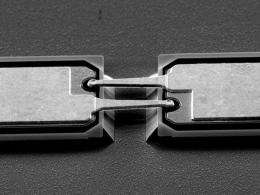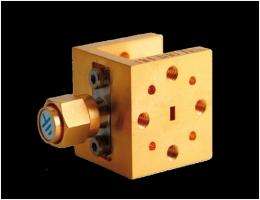UK company to transform electronics for security scanners, cancer detection

A new UK company set to transform the use of terahertz electronics for applications in security imaging, telecommunications and cancer detection has won (Wednesday 24 November) a prize in Research Councils UK (RCUK) Business Plan Competition 2010.
Teratech Components Ltd, a recent spinout from STFC, will use the £10,000 prize towards kick-starting the company's business to exploit the commercial applications of terahertz electronics - engaging with industry and new markets outside of the traditional space sector.
Terahertz (THz) applications span the physical (security imaging), biological (cell formation) and medical (cancerous tumour detection) sciences with a growing interest in the application of THz frequencies to security imaging through clothing in airport scanners and to non-destructive pharmaceutical and manufacturing inspection through multilayered or opaque surfaces.
The unique properties of THz radiation also include high frequency radar to produce high resolution images of objects through cloud, fog and dust storms to support aircraft landing in harsh environments.
The high frequency THz band of the electromagnetic spectrum is still largely unexplored and was originally developed for niche applications in astronomy and monitoring of the Earth's atmosphere. As the technology has matured however, and the costs reduced, new commercial applications are becoming viable.
The Teratech team is led by Byron Alderman from STFC. Byron said, "This is excellent news today and will give the company a real boost. Our vision is to transform the use of terahertz electronics technology and working towards the Business Plan Competition is helping us towards achieving this aim. The competition has involved working closely with business and industry to develop our skills in business planning. In the past the prize money awarded to winners of the RCUK Business Plan Competition has proved invaluable in helping companies grow their business and I know we'll put it to good use!"

Teratech was spun out from technology developed by the Millimetre Technology (MMT) group at RAL Space. The group have developed THz components over the last twenty years for use in the Earth observation and astronomy fields, and in the security sector.
Professor Dave Delpy, RCUK Impact Champion said: "It is vital to the future prosperity of the UK that research and business work together in partnership. The RCUK Business Plan Competition is just one of the current mechanisms that the Research Councils have to help researchers work with business and industry to gain the relevant skills to turn their work into successful commercial ventures. The five finalists in this year's Competition come from a variety of academic backgrounds and they should each be congratulated for their commitment over the last year, during the demanding process of turning their research into award winning business propositions."
The RCUK Business Plan Competition has been running for six years and has helped researchers work with business and industry to gain the appropriate skills to turn their work into successful business applications.
Provided by Science and Technology Facilities Council















